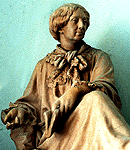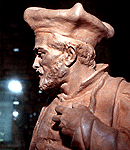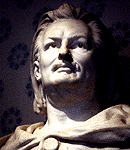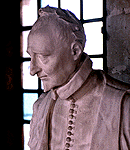
|
of the Loire Valley |
|
|
(Paris 1804 - Nohant 1876) | |
|
Her first novel Rose et blanche was written in
collaboration with Jules Sandeau who gave her her pen
name. After several turbulent years marked by affairs
with Alfred de Musset, Liszt and Chopin, she finished her
life at her residence in Nohant (which can be visited). Her
abundant works were a great success in her
lifetime. |
 ©NRCO-GP |
|
(1494 near Chinon - 1553 Paris) | |
|
He lived in different abbeys of the Loire Valley until
the age of thirty. He was a priest from 1511 to 1527
when he renounced his vows. He became a doctor and then
again a priest. He entitled his first book Les
Horribles et épouvantables faits et prouesses du
très renommé Pantagruel published in 1532
under the pen name Alcofribas Nasier. |
 ©NRCO-GP |
|
(Loches 1797 - Paris 1863) | |
|
Until 1827, he was a captain in the royal guard and lived
a monotonous life in the garrison. He wrote his first
book Poêmes antiques et modernes in 1826.
Disappointed by the literary world and an uneventful
military career, he withdrew to his country home of
Maine-Giraud (Charente - 16). | |
|
(Tours 1799 - Paris 1850) | |
|
After studying law, he began a career as a notary clerk
before writing his first novel Gobseck in 1830.
This prolific writer, author of La Comédie
Humaine which is a collection of about a hundred of his
novels and short stories, lived most of his life in his
residence at Saché (near Azay-Le-Rideau,
Indre-et-Loire - 37). |
 ©NRCO-GP |
|
(La Haye Descartes 1596 - Stockholm 1650) | |
|
He went to primary and secondary school at La
Flèche until the age of 20. In 1617, he
enrolled in the Dutch army and lived in Holland from 1617 to
1649. His most famous work, Le Discours de la
méthode (Discourse on Method), was
published in 1637. The house where he spent part of
his childhood can be visited in the city of
Châtellerault (Vienne - 86). | |
|
(Couture-Sur-Loir 1524 - Saint-Côsmes-en-L'Isle near Tours 1585) | |
|
Forced to renounce a military career because of deafness,
he turned to the study of Latin and Greek under the
direction of Dorat. Having ecclesiastic advantages and being
an official poet of Charles X, he intervened, through his
writings, on the side of the Catholics in the Wars of
Religion. After the failure of his sonnet, La
Franciade, Ronsard withdrew to the priory of
Saint-Cosmes-en-l'Isle. The priory located near Tours can be
visited and each year, at the beginning of summer, it hosts
a rose festival. |
 ©NRCO-GP |
|
(Liré, Maine-et-Loire 1522 - Paris 1560) | |
|
Poet member of the Pléiade, for which he wrote the
manifesto Défense et illustration de la langue
française in 1549. (The Defense and
Glorification of the French Language). His sonnets,
which are often melancholic, express his disappointments and
nostalgia. This is true of Les Regrets which he
wrote in 1558 during his trip to Rome as secretary for his
cousin, the cardinal Jean du Bellay. | |
|
|
|
|